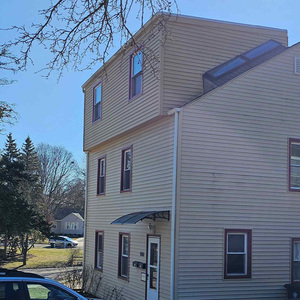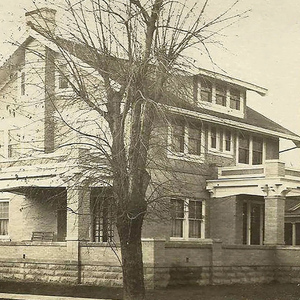Can anyone comment on purchasing a house with an active underground oil tank ?
Discussion Forum
Discussion Forum
Up Next
Video Shorts
Featured Story

A small and dated house lends its foundation to a stylish new home with more than twice the space.
Featured Video
SawStop's Portable Tablesaw is Bigger and Better Than BeforeHighlights
"I have learned so much thanks to the searchable articles on the FHB website. I can confidently say that I expect to be a life-long subscriber." - M.K.
Fine Homebuilding Magazine
- Home Group
- Antique Trader
- Arts & Crafts Homes
- Bank Note Reporter
- Cabin Life
- Cuisine at Home
- Fine Gardening
- Fine Woodworking
- Green Building Advisor
- Garden Gate
- Horticulture
- Keep Craft Alive
- Log Home Living
- Military Trader/Vehicles
- Numismatic News
- Numismaster
- Old Cars Weekly
- Old House Journal
- Period Homes
- Popular Woodworking
- Script
- ShopNotes
- Sports Collectors Digest
- Threads
- Timber Home Living
- Traditional Building
- Woodsmith
- World Coin News
- Writer's Digest


















Replies
How old is the tank? If I recall correctly, tanks have a lifespan of 15-20 years, but that may be for the older ones. I think newer tanks are double walled and/or have a longer lifespan. You may want to check with your state environmental agency on the legal aspects of owning a tank, especially if it has or develops a leak. If you have concerns, you can use that as a bargaining chip or walk away.
Aaron
I would make sure there is a statement concerning the tank either in the formal disclosure paperwork or one you present to owner
it may be insured by fed govt or state ( & oil purveyors )
there was a program yrs ago where all got together & insured the tanks most likely to prevent a home owner from turning his back on a problem because of the exorbitant costs and sharing the burden w/ those w/ deeper pockets insuring a better environmental state
it may be on the list if that is still active
assuming this is the warm season and none is being burned would be a good idea to test ( check level ) one day and return again in say three days
if there is water it would be on bottom & you might see it on stick
I think there are test strips that show moisture / water
There is a federal law that all underground tanks had to be removed by some date certain october a couple years back ago. Any owner now of poroperty with this condition is liable for any damages, fines and fees
Welcome to the
Taunton University of Knowledge FHB Campus at Breaktime.
where ...
Excellence is its own reward!
You might want to double check that idea
See, e.g.: http://www.deq.state.id.us/waste/prog_issues/ust_lust/index.cfm
"Certain types of tanks are specifically exempt from federal UST regulations:
Small tanks that hold 110 gallons or less.
Farm and residential tanks that hold 1,100 gallons or less of motor fuel used for noncommercial purposes.
Tanks storing heating oil used on the premises where it is stored. "
In my experience, it is extremely rare that such a blanket statement can be made about any legal requirements. There are (almost) always exceptions and defintions and limitations on the general rule.
Edited 7/10/2006 7:34 pm ET by rjw2
Could be that pour state went beyond in requirements. They usually do, and groundwarer protection is one of their few strong suits. They are also fond of blaming it all on the feds
Welcome to the Taunton University of Knowledge FHB Campus at Breaktime. where ... Excellence is its own reward!
You don’t want to own any land that has any underground fuel tank Until the licensed testing company with the state and has a big bond and insurance polices and has certified that it has not leaked and there is no oil in or on the land to you and the state has it on file.
Because if you buy the land even after testing and the state finds oil on your land you get to pay for the clean up. That way the testing company gets to pay for it because they tested it for you. But hang on to your hat when you see the bill for the testing.
Older house near mine just went through tank removal due to leak. $170,000 and a 6 month job (maybe slow guys).
First step testing, then they demo'ed the garage, then dug a deep hole 25' from what i saw! Special trucks for haul away.
More testing, some more digging, more testing, then the big fill (8 large trucks+) rebuild garage and back rooms.
Now it looks as it was and up for sale at $359,999.
If you buy you must get some kind of insurance to protect you!
There is no federal law AFAIK against underground oil storage tanks, and homeowners have always been liable for cleanup in the event of leakage. A number of states have passed laws for gasoline storage (requiring removal of dated tanks and additional safeguards) but gasoline migrates underground to a greater extent than oil (and MTBE, a common gasoline additive) has proven to migrate through nearly pristine tanks into groundwater. Oil tends to stay local (heavier hydrocarbons) and remediation is not that bad, simply removal of obviously contaminated soil.
If you didn't buy a house that had an underground tank around some parts of the country, much of your housing choices would be eliminated. Properly inspected and maintained, an underground tank is fine, especially for oil. Indoor tanks and above ground tanks leak just as well. In the city, tanks in the basement are common, as are incidents where idiot oil operators dump oil in the wrong pipe and the basement gets filled. You are simply moving the problem from underground to a location where it is more visivle.
Check out: http://dep.state.ct.us/wst/remediation/residentialUSTguidance.pdf
Very regional issue, and may vary state by state.
Some areas of the country have strict state regs, some have effewctive ban's because of bank lending policies.
You need local expert advice, and a local gypsy to forcast what the future may hold.
Oil tanks should scare the heck out of you unless they are known to be in good condition. The tanks weren't all that thick to begin with and rust doesn't care who you are.
It's also a falacy that remediation isn't all that hard, depending on your ground conditions. If test holes show you've been leaking into your neighbors lot, guess who gets to clean it all up? We're not talking about inexpensive measures.
If you happen to be in an area that has easy access to underground water, watch out, since you'll be cleaning up more than your neighbor's back yard.
Back in college I was the marketing guy for an environmental engineering firm that handled many of these cleanups. Some lots were so poluted that the buildings had to be torn down and the lot vacated. Your soil conditions can block the damage or pull the contamination for great distances and everything inbetween.
If the engineers, hydrologists, geologists, or engineering techs read your post they'd just chuckle since they wouldn't dream of buying property with an underground tank.
Like building next to a river that floods every other year. You can do it, but why?
There is a property here that had oil contaminated soils. The opwner moved out of state and let the bank have it. The bank was forced to clean up before selling. rumours are that the cost was about $150,000 for the cleanup whioch took over a year due to weather and testing procedures. They were glad to finally dump it for $85,000
Welcome to the Taunton University of Knowledge FHB Campus at Breaktime. where ... Excellence is its own reward!
The bank was forced to clean up before selling. rumours are that the cost was about $150,000 for the cleanup whioch took over a year due to weather and testing procedures. They were glad to finally dump it for $85,000
Banks must see all sorts of crazy things when loans go bad.
My current house that I bought last year had one... I didn't know better or anything about the danger, but my dad's friend works for an environmental lawfirm as a consultant and basically said "get rid of it ASAP (and quietly...)".
I got quotes from a few major firms and one old school plumber / site work contractor father / son duo. Ended up hiring them for about half the other bids (3K instead of 6K).
Was able to visually verify that the tank was rusty but not leaking. Took away some of the soil nearby as precaution. I think I lucked out since the tank was only 17 yrs old. This old plumber was a piece of work - didn't understand why I wanted to get rid of it and put in a regular tank in the basement. He said "Hell I've got 3 1000g tanks on my property - screw the oil companies and the gov't"! I go the feeling he ran most of his equipment/trucks on fuel oil instead of diesal... ;-)
Good luck!
I built a vacation home in 1970, lakefront with every neighbor having wells. The gas shortage in 1972? scared me, so I put in a 1000 Gal. steel tank for gasoline. Began to worry about rust,etc. so replaced tank with a fiberglass tank in 1980. Still worried about neighbors wells and lake, so had tanks removed 2001, with testing of the ground to prove no leaks. Cost was $2800 including state approved labratory reports and state reports. Very glad I did remove tanks!
I live on Long Island and had a 275 gallon oil tank buried in the ground in front of the house. All the Dept of Health wanted was me to sign an affadavit that to my knowledge the tank doesnt and never did leak. I signed it, had a company drain it and fill it with a foam product and cut off the vent and fill lines. It was not required to be removed. It was down 4 feet in the ground, I poured my kitchen slab right over it, which was ok'd by local inspectors.
In MA underground tanks are frowned upon, unless they are in a concrete lined pit, with a suitable membrane seal and an alarm system. My house came with a 4000 gallon tank back in 1997, which cost $8000 to be removed at the time. The former owner of the house would purchase heaing oil during the off season when it was cheaper. Most mortgage companies will not issue paper if an underground tank is present.
J
Renaissance Restorations LLC
Victorian Home Restoration Services
http://www.renaissancerestorations.com